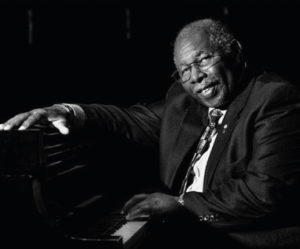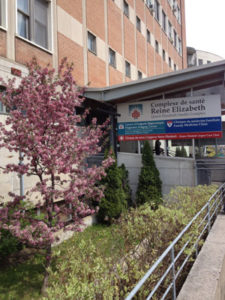Archive for month: October, 2017
By Ashlie Bienvenu
It seems appropriate to dedicate this article to Oliver Jones, as he recently performed in Little Burgundy at the renaming of Sainte-Cunegonde Social Centre, into the Oliver-Jones Centre. The renaming was to honour a talented and renowned musician; however, the honour was also due to his dedication and commitment to his hometown, Little Burgundy. Oliver Jones has led a very amazing life, from his childhood as a prodigy, to his performing and recording points in his career, to the growing fame and subsequent world tours, and to his recent retirement. However, throughout all of these milestones, Jones has stayed true to his roots and remained a prominent influential figure in his community.
Born on September 11, 1934, in Little Burgundy, Montreal, to Barbadian parents, Jones had an early affinity for music. Considered a child prodigy, Jones was playing the piano in the Union United Church at the age of five, and playing in Café St-Michel at the age of nine. He later went on to play at clubs, one of which was the famous Rockhead’s Paradise. During his childhood Jones was tutored in classical piano by Madame Bonner, and later by Daisy Peterson Sweeney, the sister of Oscar Peterson. Jones later went on to tour the United States with a show called the Bandwagon. (Ware & Gagnon, 2016)
Jones worked in Montreal until approximately 1963, until he moved to Puerto Rico with his family to become the music director for the Kenny Hamilton Show Band. Jones returned to Montreal in 1980 and began to collaborate with Charles Biddle. They performed around Montreal, in bars and clubs, before opening a club of their own, the Biddle’s Jazz and Ribs, now called the House of Jazz, for which Jones was the in-house pianist. In 1985 Jones and Biddle recorded an album that caught the interest of Jim West, a record producer for the Jazz label, Justin Time. Jones, in a trio with Biddle and Bernard Primeau, recorded numerous songs. However, as Jones’ solo career took off, he was unable to devote his time to Biddle’s club. He played in Jazz festivals, went on tour around the world, and recorded over 15 albums. (Ware & Gagnon, 2016)
Jones also taught at Laurentian University, in 1987, and McGill University, in 1988, until his retirement in 1995. He was given many honours and awards, such as the PROCAN award, for his contributions to the world of Jazz, the Oscar Peterson Award, the Golden Ducat, Knight of the Ordre national du Québec, Officer of the Order of Canada, Governor General’s Performing Arts Award, and the Martin Luther King Jr. Award, for his contributions to the Black community in Canada, especially Montreal. Jones announced his retirement, originally, in 2000. He decided to continue touring in 2002 and continued with his music career until 2016, where, at the tenth annual International Jazz Festival, he announced his retirement due to health issues. Jones hoped that there would be young Jazz musicians to pick up the torch after him. (Ware & Gagnon, 2016)
One such young musician, who was inspired and supported by Jones, is the seventeen year old Montrealer, Daniel Clarke Bouchard. This young piano prodigy credits Jones as being his mentor and says that “It’s really changed [his] whole career, being able to be around [Jones] and have [his] career progress with his watchful eye.” (CBC News) Jones has made an impact on many young musicians from the Montreal Black Community. In fact, at his performance this past month, at the renaming of the Sainte-Cunegonde Social Centre, Jones gave a speech in which he declared he was “passing the baton to the next generations.” (CBC News) He also used this speech to give hope to the children who come from less influential homes and neighbourhoods. He uses himself as an example that, if you work hard enough, it does not matter which walk of life you come from. (CBC News)
Therefore, even though Jones is set to retire, his memory, legend, and good works will live on in Little Burgundy and, more generally, Montreal. Indeed, his name will live on in Little Burgundy, through the newly named Oliver-Jones Centre, which provides services to the St. Henri/Little Burgundy community. His hard work and dedication will always serve as an example to children to follow their dreams, no matter their circumstances.
Bibliography
Jazz legend Oliver Jones gives another ‘last’ performance after community centre renamed in his honour. (September 17, 2017). CBC News. Retrieved from http://www.cbc.ca/news/canada/montreal/oliver-jones-little-burgundy-1.4293790.
Ware, E. & Gagnon, A.J. (October 6, 2016). Canadian Encyclopedia: Oliver Jones. Historica Canada. Retrieved from http://www.thecanadianencyclopedia.ca/en/article/oliver-jones-emc/.
For Full Version of Semaji September 2017 Click Here
By Ashlie Bienvenu
We are pleased to announce that, as of September 11th, 2017, the Queen Elizabeth Health Complex (QEHC), which predominantly serves the Anglophone community in NDG, has been given the status of “super-clinic.” (CBC News) “Ensuring ready access to both medical and alternative health services, the QEHC is an attractive option to avoid the overcrowding, delays and other inconveniences so often experienced in hospitals and CLSCs.” (QEHC)
The QEHC has a long history of service to the community, since “1894 when it used to be the Montreal Homeopathic Hospital,” (QEHC) situated on McGill College Avenue. The hospital was later moved to Marlowe Avenue, its current NDG location, in 1927, when there was a demand for more beds and space. This hospital became renowned for their cutting edge medical practices and attentive staff, so much so that they were honored with the name of King George VI’s wife, Queen Elizabeth. However, the hospital’s very existence was put in jeopardy when there was a government directive, in 1995, to cut health care costs through the closure of “Montreal-area acute-care hospitals.” (QEHC) In the year after this directive, “the QEH Board of Directors, the QEH Foundation and other bodies and individuals in the community joined forces and decided to take matters into their own hands by forming the Centre-West Community Health Corporation (CWCHC).” (QEHC) This new not-for-profit organization allowed for the continuation of acute care services in the community.
“The Queen Elizabeth Health Complex, under the management of the CWCHC, is therefore a reincarnation and a new legal form for a century-old community institution. Its mission is to provide efficient, readily accessible medical services, complementary and alternative therapy, as well as emotional and mental health services that will contribute to improving the health of our community in accordance with the policies and guidelines of the Government of Quebec.” (QEHC)
The QEHC offers services such as:
-A walk-in clinic, open 365 days a year
-A medical specialist clinic: cardiology, internal medicine, neurology, urology, otolaryngology, endocrinology, ophthalmology, and a special educational diabetes program.
-Imaging centre: radiology, ultrasound, digital mammography, bone density, and fluoroscopy services.
– The MUHC Department of Family Medicine.
– A dental clinic affiliated with the McGill University Faculty of Dentistry.
– Health services, such as chiropractic, nutrition, dietetics, physiotherapy, osteopathy, audiology and aesthetic medicine.
-Provides in-home nursing services.
-Mental health services.
-Complementary and alternative health care services: acupuncture, massotherapy, homeopathy, etc. (QEHC)
Please visit the QEHC website (http://www.qehc.org/) for more information.
Bibliography
NDG’s Queen Elizabeth Health Complex to become ‘super-clinic’. (August 25, 2017). CBC News. Retrieved from http://www.cbc.ca/news/canada/montreal/quebec-health-care-super-clinic-1.4262321.
QEHC. Queen Elizabeth Health Complex. Retrieved from http://www.qehc.org/.
For Full Version of Semaji September 2017 Click Here
By Yvonne Sam (Chairman of the Rights and Freedoms Committee)
Originally Published in The Montreal Gazette, September 18, 2017
Testimony has a greater impact if one can see and hear the person testifying. The hearings are an opportunity to heighten public awareness.
The Quebec inquiry on systemic discrimination and racism has yet to begin hearings, but what’s already apparent is that the Couillard government does not want the exercise to be transparent.
When the consultation was announced in July, all Quebecers were urged to participate, with the hearings being touted as an occasion to find tangible and permanent solutions to the issues at hand. Now we learn that Immigration Minister Kathleen Weil and the Quebec Human Rights Commission have indicated that local consultations will be held behind closed doors, hidden from the eyes of the media and the citizenry, away from the public setting that was expected by the public.
According to a spokesperson for Weil, “The people who wish to be heard will be heard.”
But by whom?
Weil herself has proffered the defense that privacy will ensure that those testifying will feel open to relaying their experience.
No way! Poor say!
Systemic racism concerns the denial of political, economic and social opportunities to individuals on account of their race or ethnic background. Marginalized groups who regularly deal with discrimination, mistreatment and unfair treatment are used to not being heard and, above all, not being taken seriously, and may view testifying behind closed doors as an extension of that attitude.
Let us not forget that there are many who already have little faith in the government and its previous handling of racism and discrimination, and now are called upon to sit behind closed doors to discuss their sufferings and injustices. This is similar to the fox declaring that he is now a vegan so that he can oversee the hen house. The history of the beleaguered Human Rights Commission, mandated to oversee the hearings but currently embroiled in its own issues, speaks volumes in itself; if it had, over the years, done a better job of carrying out its functions, this public consultation may have not been needed. It seems as plain as falling rain that hearings behind closed doors must be for the benefit of the rights commission, as they are not helpful to the victims.
The decision to hold closed-door hearings may additionally be because the province is unwilling to stir up debate as was evoked by the Bouchard-Taylor hearings on reasonable accommodation a decade ago.
Certainly, testimony has a greater impact if one can see and hear the person testifying. For those who do not feel the impact of systemic discrimination and racism, and may not even know it exists, hearing testimony as relayed by media could be educational. It is challenging to see a problem or barrier if it is not within our lived experience, or to comprehend its urgency. The hearings are a good opportunity to heighten public awareness of these issues.
The second phase of the inquiry, open to the public, begins in November and features the testimony of experts and transmission of some of the issues raised by working groups that are to focus on specific areas, like education and employment. Why would only some of the issues be given priority, rather than have them all addressed?
Of further concern is the fact that the government intends to release the findings along with an action plan in the spring, just months shy of the general election scheduled for October 2018. That does not leave much time for implementation of any recommendations.
It is not too late for the government to clean the slate, for at the end of the day the objective is to have a better Quebec, where racism and discrimination would be sent into remission.
The closed doors should be opened wide, so there is nothing to hide.
For Full Version of Semaji September 2017 Click Here
[gview file=”https://bcrcmontreal.com/wp-content/uploads/2017/10/Semaji-September-2017.pdf”]



